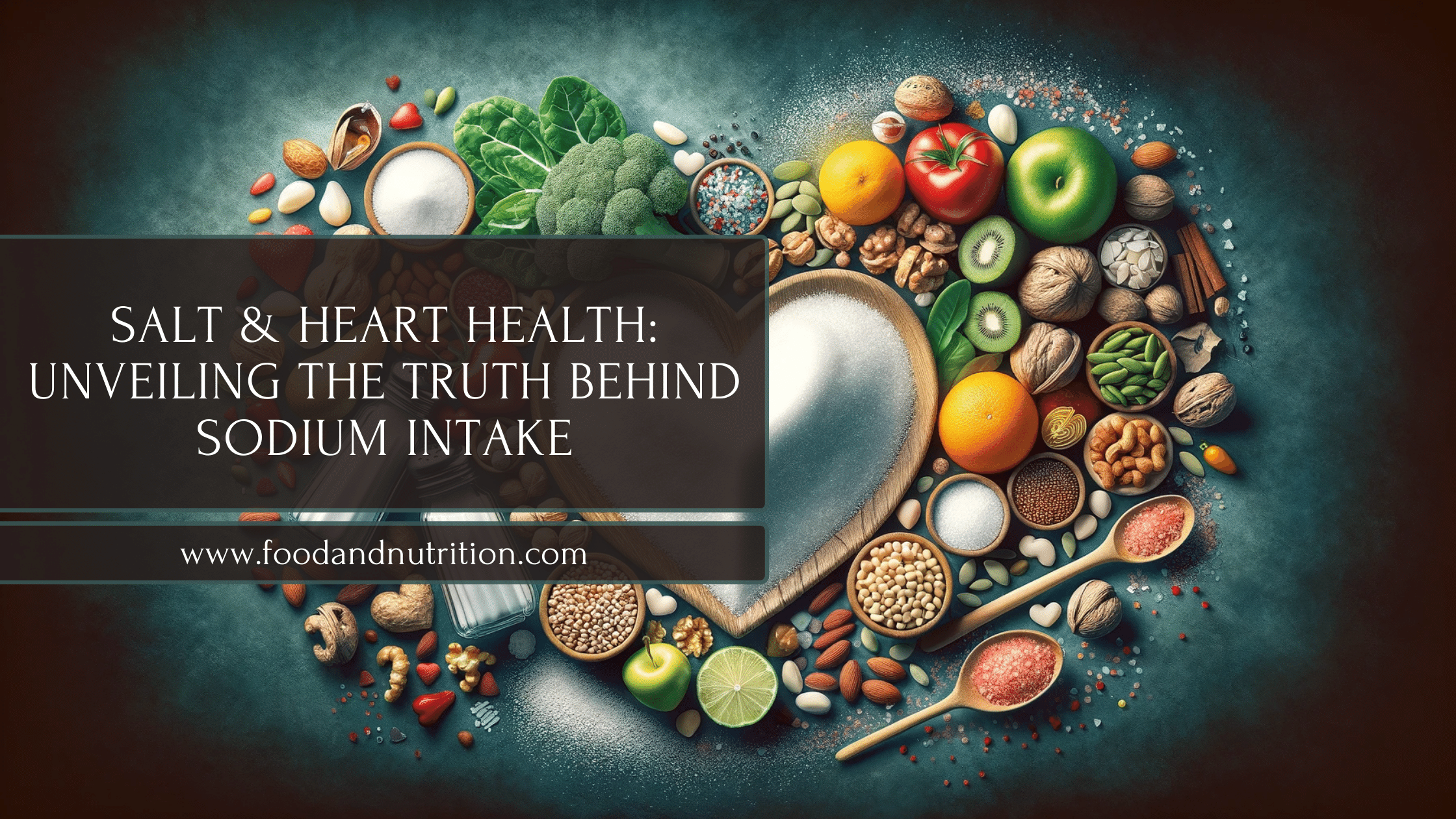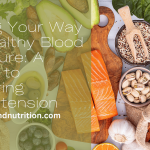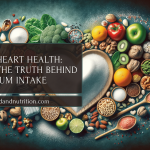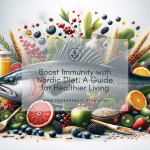Salt & Heart Health: Unveiling the Truth Behind Sodium Intake

Introduction
In the realm of nutrition and heart health, few topics have spurred as much debate and evolving understanding as the impact of salt (sodium) intake on our well-being. As we navigate through the tides of changing dietary guidelines and scientific revelations, it becomes increasingly vital to grasp the implications of salt consumption for heart disease. This understanding is not just a matter of academic interest; it’s a cornerstone of making informed decisions about our health and diet.
For decades, the narrative surrounding salt intake and heart health has been a story of unfolding layers and shifting paradigms. From the initial warnings of the Surgeon General to the nuanced findings of recent studies, our comprehension of salt’s role in heart disease has been continually refined. In this blog, we aim to unravel this complex tapestry, offering a clear, evidence-based exploration of how our perceptions and guidelines about salt and heart health have evolved over the years.
Join us as we delve into the 2020-2025 Dietary Guidelines, retracing our steps to pivotal moments in scientific research and policy developments. Whether you’re a health enthusiast, a curious reader, or someone striving to make heart-healthy choices, this journey through the annals of dietary science promises to enlighten and empower your dietary decisions. Let’s embark on this insightful exploration together, understanding that each piece of knowledge brings us closer to optimal health.
Current Dietary Guidelines for Salt Intake
In the latest iteration of the Dietary Guidelines for Americans, covering the years 2020-2025, there’s a renewed emphasis on the importance of moderating sodium intake. Understanding these guidelines is crucial, not just for health professionals, but for every individual mindful of their heart health.
The Recommended Daily Sodium Intake
- The Threshold: The current guidelines recommend that adults and children over the age of 14 should limit their sodium intake to less than 2,300 milligrams (mg) per day. This amount is roughly equivalent to one teaspoon of table salt.
- The Context: This recommendation is rooted in extensive research indicating that higher sodium intake is associated with increased blood pressure, a major risk factor for heart disease and stroke.
Interpreting % Daily Value (%DV) for Sodium
- Label Literacy: Understanding the %DV for sodium on food labels is pivotal. A %DV of 5% or less per serving is considered low, whereas 20% or more is high. This provides a quick gauge to assess the sodium content in packaged foods.
- Informed Choices: By using %DV as a guide, individuals can make more informed choices about their food purchases, aiming to consume less than 100% DV of sodium each day.
The Role of Packaged and Prepared Foods
- A Hidden Culprit: It might surprise many to learn that over 70% of dietary sodium comes from eating packaged and prepared foods, not from table salt added during cooking or at the table.
- The FDA’s Initiative: Recognizing this, the U.S. Food and Drug Administration is collaborating with the food industry to reduce sodium levels across a wide variety of foods.
The Impact on Blood Pressure
- A Cascade Effect: Sodium attracts water, and a high-sodium diet increases the volume of blood in the bloodstream. This, in turn, can elevate blood pressure and over time, strain the heart, arteries, and kidneys.
- Age-Related Considerations: Importantly, as we age, the need to monitor sodium intake becomes even more critical, given the natural rise in blood pressure that occurs with advancing years.
Understanding and adhering to these guidelines is more than a recommendation; it’s a pathway to maintaining a healthier heart and preventing the risk of cardiovascular diseases. As we continue to dissect the layers of dietary guidelines, remember that knowledge is the first step in making empowered health choices.
The Historical Perspective
Tracing the historical path of dietary salt recommendations offers us not just a glimpse into the evolution of nutritional science, but also an understanding of how public health policies have adapted over time. This historical perspective is essential to appreciate the context behind current guidelines and to recognize the dynamic nature of nutritional science.
The Early Warnings
- 1979: The Surgeon General’s Report: This landmark report was one of the first to clearly state that high salt intake was a significant contributor to elevated blood pressure, laying the groundwork for future guidelines and public awareness.
- 1980: USDA’s Dietary Guidelines: Following the Surgeon General’s report, the U.S. Department of Agriculture (USDA) issued dietary guidelines cautioning against excessive salt consumption, marking a pivotal moment in national dietary policy.
The DASH Diet Studies
- 1997: The First DASH Trial: The Dietary Approaches to Stop Hypertension (DASH) study highlighted the profound impact of dietary patterns on blood pressure. This study showed that a diet rich in fruits, vegetables, and low-fat dairy, and low in saturated fat and cholesterol, could significantly reduce blood pressure.
- 2001: The Second DASH Trial: Building on the initial findings, the second DASH trial reinforced the benefits of the DASH diet and further established the importance of dietary choices in managing hypertension.
The 2005 Dietary Shift
- Emphasis on Reduction: The 2005 U.S. dietary guidelines placed a stronger emphasis on reducing salt intake, underlining the link between sodium consumption and the risk of elevated blood pressure.
Through this historical lens, we see a gradual but definitive shift from general warnings to more specific dietary patterns and recommendations. The journey from the Surgeon General’s report to the comprehensive guidelines of today reflects an increasing sophistication in our understanding of how salt impacts heart health. This evolution underscores the importance of staying informed and adaptable, as nutritional science continues to advance and refine its guidance for optimal health.
Key Scientific Studies and Their Implications
The journey through the landscape of salt intake and heart health is marked by pivotal scientific studies that have shaped our current understanding. These studies not only challenged existing notions but also opened new avenues of research and recommendations.
2004 Meta-Analysis: A Broader View
- Modest Changes for the Healthy: A comprehensive meta-analysis in 2004, encompassing 57 randomized controlled trials, concluded that healthy individuals without hypertension experienced only modest decreases in blood pressure when they reduced salt consumption. This finding prompted a nuanced consideration of salt intake recommendations based on individual health status.
2009 Meta-Analysis: Challenging Assumptions
- Redefining Risk Factors: The 2009 meta-analysis, evaluating salt consumption studies from 1966 to 2008, presented a startling revelation. Contrary to long-held beliefs, it found that individuals with the highest salt intake showed little or no increased risk of heart disease compared to those with the lowest intake. This finding challenged the simplistic view of salt as a universal villain in heart health, suggesting a more complex relationship between salt intake and cardiovascular risk.
2010 Meta-Analysis: Dietary Fats and Heart Disease
- Revisiting Dietary Fats: In 2010, another significant meta-analysis, which included data on almost 350,000 subjects, concluded that there was no significant evidence linking dietary saturated fats with an increased risk of coronary heart disease or cardiovascular disease. This shifted the focus from just salt to a broader understanding of dietary components in heart health.
These studies illustrate the evolving nature of scientific research in nutrition and heart health. They highlight the importance of continuously updating dietary guidelines to reflect the latest scientific understanding. This evolution in scientific perspective underscores the need for a personalized approach to nutrition and heart health, taking into account individual health conditions, dietary patterns, and lifestyle factors.
The Recent Developments in Science and Policy
As we progress into the most recent developments in the field of salt intake and heart health, it becomes evident that the narrative is far from static. The last decade has seen intriguing developments that continue to shape our dietary strategies and health policies.
Mixed Results and Nuanced Understanding
- Varied Impacts of Salt Reduction: Recent research has shown mixed results regarding the impact of salt reduction on heart health. Particularly notable is the finding that individuals with hypertension benefit more significantly from reduced-salt diets, potentially leading to decreased reliance on blood pressure medications and a lower risk of heart-related problems.
- Individualized Dietary Recommendations: These findings have led to a more individualized approach in dietary recommendations, acknowledging that the effects of salt intake can vary greatly among different populations and health conditions.
FDA’s Initiative and Public Health Campaigns
- Collaboration with the Food Industry: In response to these evolving understandings, the U.S. Food and Drug Administration has been working with the food industry to reduce sodium levels in a wide range of foods, acknowledging the significant role of packaged and prepared foods in the American diet.
- Educational Efforts: Concurrently, public health campaigns have been intensifying their efforts to educate the public about the risks of high sodium intake, especially in the context of heart health.
Looking Towards the Future
- Continuous Research: The field of nutritional science is ever evolving, with ongoing research aimed at refining our understanding of salt’s impact on heart health across different populations, age groups, and lifestyles.
- Adapting Policies and Guidelines: As new findings emerge, health policies and dietary guidelines are expected to continue adapting, reflecting the latest scientific insights, and aiming for the most effective public health strategies.
In this landscape of continuous discovery and adaptation, staying informed and responsive to new research is crucial. As individuals, understanding these developments enables us to make more informed choices about our diet and health, taking into account our unique health profiles and needs.
Practical Tips for Managing Salt Intake
While understanding the science and policy developments is crucial, it’s equally important to translate this knowledge into practical, everyday actions. Managing salt intake effectively is a key component of a heart-healthy lifestyle. Here are some actionable tips to help you navigate this aspect of your diet.
1. Understanding and Using Food Labels
- Reading Nutrition Facts: Pay close attention to the sodium content listed on food labels. Use the % Daily Value (%DV) to gauge how a particular food item fits into your daily sodium allowance.
- Comparing Products: Use food labels to compare sodium content between similar products and choose the options with lower sodium levels.
2. Mindful Eating at Restaurants
- Ordering Strategies: When dining out, opt for dishes that are likely to be lower in sodium. Don’t hesitate to ask for sauces and dressings on the side, as these can be high in salt.
- Portion Control: Be mindful of portion sizes, as larger portions can lead to higher sodium intake.
3. Cooking with Less Salt
- Herbs and Spices: Experiment with herbs and spices to add flavor to your dishes instead of relying on salt. This not only reduces sodium intake but also enhances the nutritional value of your meals.
- Salt Alternatives: Consider using salt substitutes or low-sodium versions of sauces and condiments.
4. Being Aware of ‘Hidden’ Sodium Sources
- Processed and Packaged Foods: Be aware that many processed and packaged foods, even those that don’t taste particularly salty, can be high in sodium. Always check the labels.
- Sneaky Sodium: Foods like bread, cereals, and certain dairy products can contain more sodium than you might expect. Keep an eye on these items as part of your overall sodium management.
5. Gradual Reduction
- Slow and Steady: If you’re used to a high-salt diet, gradually reduce your salt intake over time. This allows your taste buds to adjust, making it easier to stick to a low-sodium diet.
Managing salt intake is an ongoing journey and an integral part of a heart-healthy lifestyle. By making informed choices, reading labels, and being mindful of how we prepare and consume our food, we can significantly impact our overall health. Remember, small changes can lead to big health benefits over time.
Conclusion
Navigating the complex terrain of salt intake and heart health can be challenging, but it is undeniably crucial in our pursuit of a healthier life. The journey through the evolving dietary guidelines and scientific research reveals a story of growing understanding and refined knowledge. It’s a narrative that underscores the importance of not just what we eat, but how we interpret and apply nutritional science in our daily lives.
As we’ve explored, the relationship between salt intake and heart health is intricate and individualized. The latest guidelines and studies offer a framework, but it’s the personal application of these insights that truly makes a difference. Whether it’s by making smarter choices at the grocery store, being mindful of sodium when dining out, or creatively seasoning our food, each small step is a stride towards better health.
Remember, the field of nutrition is dynamic, and staying informed is key to adapting effectively to new findings and recommendations. As we continue to learn more about the impact of salt on our health, it becomes increasingly clear that our best approach is one of balance, awareness, and informed decision-making.
In closing, we encourage you to embrace this journey with curiosity and a willingness to adapt. By doing so, you’re not just following guidelines; you’re actively participating in a lifestyle that supports your heart health and overall well-being.
Call to Action
Your journey towards a heart-healthy lifestyle is a personal and important one, and we hope this blog has provided you with valuable insights and practical tips to navigate the complex world of salt intake and heart health. But the conversation doesn’t have to end here. We invite you to be an active part of this ongoing dialogue:
- Share Your Story: Have you made changes to your diet that have positively impacted your health? We would love to hear about your experiences and successes. Share your story in the comments below to inspire others on their journey.
- Ask Questions: If you have questions or need further clarification on any points discussed in this blog, feel free to ask. Our community of health enthusiasts and experts is here to support and provide answers.
- Stay Updated: For more insights and updates on nutrition and heart health, subscribe to our blog. We regularly share the latest research findings, dietary tips, and heart-healthy recipes to keep you informed and engaged.
- Spread the Word: If you find this blog helpful, consider sharing it with friends, family, or on social media. Spreading awareness is key to fostering a health-conscious community.
Together, let’s commit to making informed dietary choices and taking proactive steps towards a healthier heart. Join us in this mission to embrace a lifestyle where every bite counts towards better health.
Resource Section
For those looking to further explore the topic of salt, sodium intake, and heart health, we have compiled the following list of helpful resources:
Dietary Guidelines and Recommendations
- 2020-2025 Dietary Guidelines for Americans from the USDA and HHS: Explore Guidelines
- American Heart Association’s Guidance on Sodium Intake: AHA Sodium Guidance
Sodium Reduction Initiatives
- FDA’s Voluntary Sodium Reduction Targets for the Food Industry: FDA Sodium Reduction
- CDC Resources on Sodium Reduction: CDC Sodium Information
Key Scientific Studies
- 2009 Meta-Analysis Challenging the Link Between Salt Intake and Cardiovascular Risk: View Study
Remember, while this blog post provides a comprehensive overview, these additional resources can help you dive deeper into the latest research, guidelines, and practical tips for managing your sodium intake and supporting your heart health.
- Eating Your Way to Healthy Blood Pressure: A Guide to Lowering Hypertension

- Unlock the Flavor: The Ultimate Guide to Cooking Salts

- Hydration Mastery for Athletes: Track & Field Performance Boost

- Salt & Heart Health: Unveiling the Truth Behind Sodium Intake

- Boost Immunity with Nordic Diet: A Guide for Healthier Living

- Tackling Obesity: Practical Strategies for Healthier Lives
